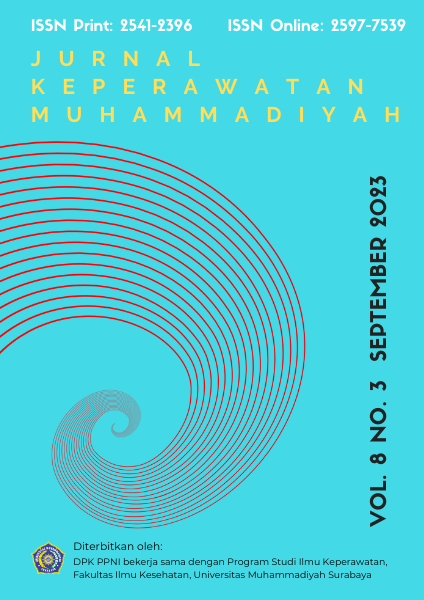Evaluasi Program Bulan Imunisasi Anak Nasional (BIAN) Di Dinas Kesehatan Kota Tasikmalaya
DOI:
https://doi.org/10.30651/jkm.v8i3.19593Keywords:
Evaluation, Immunization, BIANAbstract
Objective: Â The COVID-19 pandemic has resulted in an increasing number of children who have not had complete routine immunizations. Then efforts are needed for National Child Immunization Month (BIAN) activities. BIAN's goal is to achieve and maintain high and even population immunity as an effort to prevent PD3I outbreaks. The implementation of BIAN is carried out simultaneously in the City of Tasikmalaya. The BIAN coverage situation in Tasikmalaya City includes measles/rubella 96.2%, OPV 93.6%, IPV 89.3%, DPT-HB-Hib 93.2%. While the achievements at the Cipedes Health Center included MR 96%, OPV 100%, IPV 82%, and HIB DPT 83%. The purpose of this study was to obtain in-depth information regarding the Evaluation of the National Child Immunization Month Program (BIAN) at the Tasikmalaya City Health Office in 2022.
Â
Methods: Â This type of research is the Rapid Assessment Procedure (RAP). This research was conducted in the Tasikmalaya City Health Office area in March-June 2023. The informants in this study were as many as 10 people consisting of Immunization Program Holders (7 people) for each health center, and health service officers (3 people).
Â
Results: Â The input aspect in implementing BIAN at the Tasikmalaya City Health Office, includes personnel for implementing BIAN consisting of health workers and midwives called Korim (Immune Coordinator), insufficient funds, facilities and infrastructure to support the BIAN program including leaflets, banners and banners as well as technical guidelines and SOPs on the implementation of BIAN from technical guidelines provided by the government, as well as the timeframe for implementing BIAN for approximately 2 months. Process aspects in implementing the BIAN Program, consisting of sufficient vaccine availability, recording and reporting using the ASIK application. The output aspect in the Implementation of the BIAN Program consists of BIAN coverage which is already above 95% and the achievements of the BIAN that have been carried out have reached the target. The obstacles faced in the implementation of the BIAN Program are that most people, especially parents, are reluctant to immunize their children because they are afraid of the effects of the vaccine because there is a lot of confusing information from the environment which states that vaccines are not safe and actually add to the severity of the disease.
Â
Conclusion: Â All aspects of the implementation of BIAN are running smoothly even though there are still obstacles, especially from the community, so the service should always appeal to the heads of each puskesmas to provide counseling about the importance of immunization, especially during a pandemic and the puskesmas to assist cadres in the division of tasks for each cadreReferences
Arikunto S, 20132, Prosedur Penelitian suatu Pendekatan Praktek, Jakarta : Rineka Cipta
Aryanti, T., Supriyono, & Ishaq, M. 2015. Evaluasi Prrogram Pendidikan dan Pelatihan. Pendidikan Nonformal.
Asfaroh, J. A., Rosana, D., & Supahar. 2017. Development of The Evaluation Instrument Use CIPP on The Implementation of Project Assessment Topic Optik. ICRIEMS, 4.
Azwar A. 2016. Pengantar Administrasi Kesehatan. Edisi Ketiga. Jakarta : Binarupa Aksara.
Direktorat Jenderal Pencegahan dan Pengendalian Penyakit Kementerian Kesehatan RI, 2022, Petunjuk Teknis Bulan Imunisasi Anak Nasional Tahun 2022, Jakarta, Kementerian Kesehatan;
Gunung, I. N., & Darma. 2019. Implementing the Context, Input, Process, Product (CIPP) Evaluation Model to Measure the Effectiveness of the Implementation of Teaching at Politeknik Negeri Bali (PNB). Environmental & Science Education.
Karantina KDS dan, Penyakit D jenderal P dan P, RI KK, 2020 T. Kurikulum Pelatihan Pengelola Program Imunisasi Di Wilayah Kerjanya. 2020; Available from: http://siakpel.bppsdmk.kemkes.go.id:8102/akreditasi_kurikulum/kurikulum_200703095824ccf89c01abd8961ec0f9e73a045ab38a.pdf
Kemenkes RI. Data Informasi Profil Kesehatan Indonesia 2018. J Chem Inf [Internet]. 2013;53(9):1689–99. Available from: https://pusdatin.kemkes.go.id/resources/download/pusdatin/profil-kesehatan-indonesia/PROFIL_KESEHATAN_2018_1.pdf
Kemenppa RI. Profil Kesehatan Anak Indonesia Tahun 2018. Ilmu Pendidik. 2018;5(1):12–21.
Kementerian Kesehatan R. Hasil Utama Riskesdas 2018. 2018;
Kementerian Kesehatan Republik Indonesia. Petunjuk Teknis Pelayanan Imunisasi Pada Masa Pandemi Covid-19. Covid-19 Kemenkes [Internet]. 2020;47. Available from: https://covid19.kemkes.go.id/protokol-covid-19/petunjuk-teknis-pelayanan-imunisasi-pada-masa-pandemi-covid-19/#.X6IYy6ozbIU
Kementerian Kesehatan RI, UNICEF. Imunisasi Rutin pada Anak Selama Pandemi COVID-19 di Indonesia : Persepsi Orang tua dan Pengasuh Agustus 2020. 2020; Available from: https://www.unicef.org/indonesia/media/6071/file/Imunisasi rutin anak selama pandemi COVID-19 di Indonesia: Persepsi orang tua dan pengasuh.pdf
Kementerian Kesehatan RI. Profil Kesehatan Indonesia 2020 [Internet]. Kementrian Kesehatan Republik Indonesia. 2021. 139 p. Available from: https://pusdatin.kemkes.go.id/resources/download/pusdatin/profil-kesehatan-indonesia/Profil-Kesehatan-Indonesia-Tahun-2020.pdf
Moloeng, J, Lexy, 2016, Metode Penelitian Kualitatif, Remaja Rosdakarya, Jakarta
Mulyatiningsih, E. 2011. Metode Penelitian Terapan Bidang Pendidikan. Yogyakarta: Alfabeta.
Muryadi, A. D. 2017. Model Evaluasi Program dalam Penelitian Evaluasi. Ilmiah PENJAS.
Notoatmodjo, S. 2018. Metodologi Penelitian Kesehatan. Jakarta: Rineka Cipta.
Sugiyono, 2017. Metode Penelitian Kuantitatif, Kualitatif, dan R&D. Bandung: Alfabeta.
V. Wiratama Sujarweni, 2014. Metodologi Penelitian. Yogyakarta, PT. Pustaka Baru
Downloads
Published
Issue
Section
License
Copyright (c) 2023 Eneng Iyet Kurniawati

This work is licensed under a Creative Commons Attribution-ShareAlike 4.0 International License.
- Penulis tetap memegang hak atas karyanya dan memberikan hak publikasi pertama kepada jurnal ini yang secara simultan karya tersebut dilisensikan di bawah:Â Creative Commons Attribution-ShareAlike 4.0 International (CC BY-SA 4.0)













